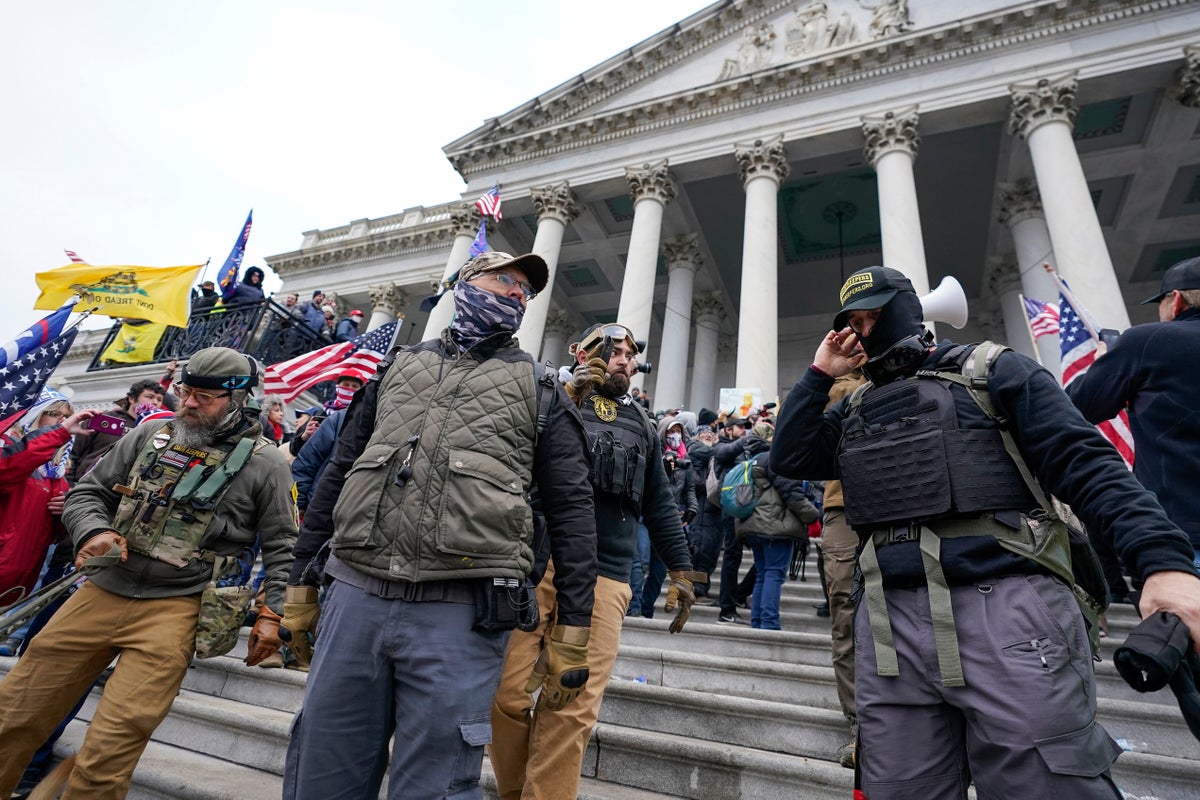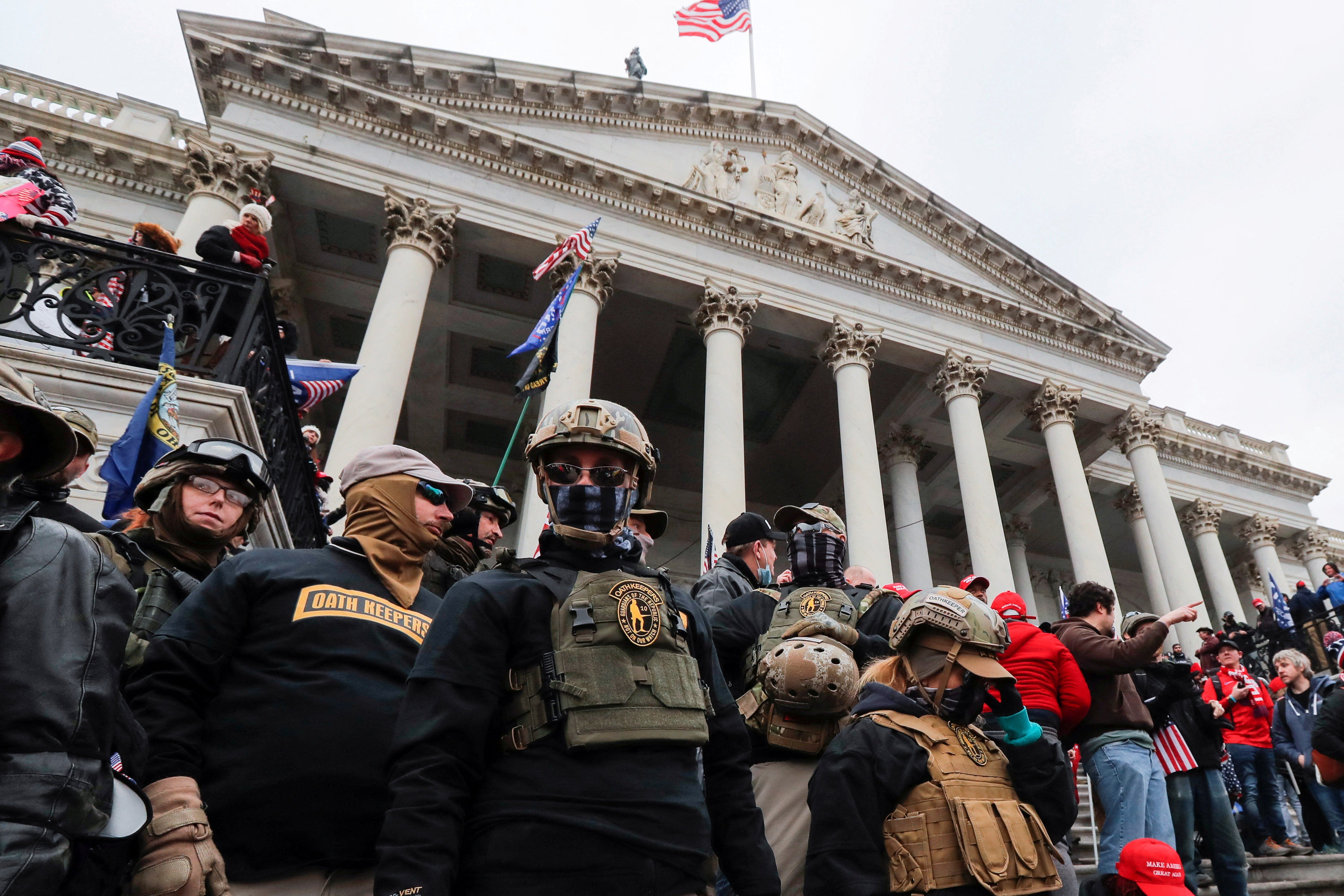
Four members of the far-right, anti-government militia group the Oath Keepers have been found guilty of seditious conspiracy.
The verdict comes nearly two months after the group’s founder was convicted of the same crime in the wake of the attack on the US Capitol.
A jury agreed that defendants Joseph Hackett, Roberto Minuta, David Moerschel and Edward Vallejo – led by group leader Stewart Rhodes – plotted to violently stop the certification of Joe Biden’s election on 6 January, 2021 and joined a mob fuelled by Donald Trump’s persistent lie that the election was stolen from him.
All four defendants were also found guilty on 23 January of conspiracy to obstruct Congress and conspiracy to destroy federal property.
“American Democracy is fragile,” US Department of Justice attorney Louis Manzo said in his closing arguments on 18 January. “It will not survive if people who are not satisfied with an election use force and violence to change the outcome.”
He argued that the defendants sought to justify their actions by invoking American revolutionary language, rendering a “perverted version of American history” in their attempts to overturn the votes of millions of their fellow Americans.
They face up to 20 years in prison.
A trial in 2022 against five members and associates of the group resulted in convictions against Rhodes and Kelly Meggs. Three other defendants were found guilty of several other felony charges but not seditious conspiracy; three additional members in separate cases pleaded guilty to seditious conspiracy and have cooperated with investigators in the hopes of receiving lighter sentences.
Including guilty pleas, a total of 10 people have been convicted of seditious conspiracy connected to January 6 thus far.
The cases mark the first successful jury convictions of Americans on treason-related charges in decades, some of the biggest trials yet in the federal government’s sprawling criminal investigation into the Capitol attack.
Fourteen people among nearly 1,000 charged in connection with the attack have faced charges of seditious conspiracy. Four members of the far-right nationalist gang the Proud Boys, including former leader Enrique Tarrio, are also on trial for seditious conspiracy for their roles in the riots.
Prosecutors say Hackett and Moerschel traveled with Meggs from Florida to Washington DC and breached the Capitol after 2pm that day.
Minuta, part of a group of Oath Keepers providing security for far-right activist Roger Stone, rode in a golf cart towards the Capitol and entered the building after 3pm, when he yelled “this is our Capitol” at law enforcement officers, according to prosecutors.
“Millions will die,” he said in a video that day. “So what. ... I’m not afraid and I’m ready to f****** go.”
Hackett and Moerschel approached the Capitol in a military-style stack formation, while Minuta and his group clashed with police as they heeded a call to breach the building, prosecutors argued.
Vallejo, a US Army veteran, helped establish a so-called “quick reaction force” at a nearby hotel in Virginia, a weapons and supply cache that was also a central piece of evidence in the trial against Rhodes and other Oath Keepers members.
Jurors heard an audio recording of Vallejo discussing the “declaration of a guerilla war” the morning of the attack.

Vallejo came to Washington DC with “nothing but a servant’s heart” and believed the events on January 6 would be “kind of like a festival,” according to defense attorney Matthew Peed.
Defense attorneys denied that there was an overarching plot to storm the Capitol, echoing similar arguments in Capitol riot cases claiming that defendants’ rhetoric in text messages, on social media and on the ground the day of the attack failed to prove that they planned to breach the halls of Congress.
But across both Oath Keepers trials and in other Capitol riot cases, federal prosecutors have repeatedly dismissed that argument. Prosecutors have pointed to reams of text, video and social media evidence and testimony from members who pleaded guilty that purports to show a plan of action to forcibly resist the outcome of a free and fair election.
“This isn’t ‘Twitter fingers,’ this isn’t a pop song,” Mr Manzo said from the courtroom. “These are men trucking guns across the country to oppose the government by force.”







